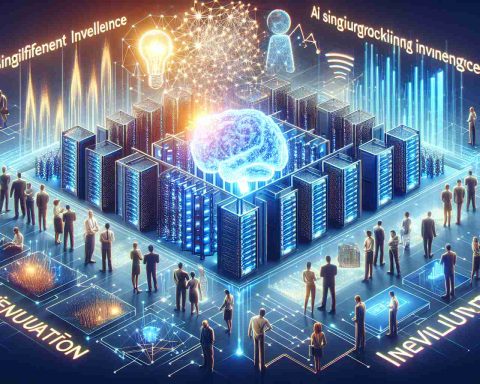Artificial Intelligence (AI) Revolutionizing Content Creation
As AI technology continues to advance, the landscape of content creation is undergoing a profound transformation. Rather than relying on traditional human-generated data, AI models are now capable of learning from existing information to generate entirely new content. This innovative approach is leading to the rapid production of vast amounts of fresh material across various platforms.
The Downward Spiral of AI Models
Recent studies published in the prestigious scientific journal Nature have shed light on a concerning phenomenon: the potential collapse of AI models when they rely too heavily on content generated by other AI systems. The research suggests that as AI models undergo just a few generations of learning from AI-generated data, they may reach a breaking point, causing their functionality to deteriorate rapidly.
Emerging Challenges and Solutions
One of the primary reasons behind this breakdown is the limited scope of information that AI models are exposed to during the learning process. As they sift through massive datasets, crucial details may be overlooked or omitted, resulting in a narrowing of the information spectrum. To combat this issue, experts propose a more meticulous curation of training data, focusing on preserving diversity and inclusivity in the content produced.
Industry Response and Collaboration
In response to the looming threat of AI model collapse, tech giants such as Google are taking proactive measures to safeguard the integrity of online content. By adjusting algorithms to prioritize content created from original human-authored sources and implementing enhanced data tracking protocols, AI developers aim to mitigate the risk of model deterioration.
Looking Ahead
While the prospect of AI-generated content flooding the internet presents both challenges and opportunities, collaborative efforts within the AI community are crucial in navigating this evolving landscape. By prioritizing ethical data practices and emphasizing diversity in content creation, the industry can strive towards a future where AI-driven content enhances, rather than undermines, the online experience.
Expanding Horizons: AI Empowering Knowledge Creation
In the realm of artificial intelligence (AI), a fascinating development is gaining momentum – the concept of AI serving AI to redefine how information is generated. Beyond just content creation, AI systems are now being utilized to collaborate with each other in synthesizing data and insights that surpass human capabilities. This paradigm shift opens up a realm of possibilities for accelerating knowledge discovery and innovation across diverse domains.
Unveiling the Potential of Multi-Agent Systems
An intriguing aspect of AI serving AI is the emergence of multi-agent systems, where multiple AI entities collaborate to tackle complex problems and generate comprehensive solutions. These interconnected networks of AI models can leverage each other’s strengths to process vast amounts of data, leading to sophisticated information generation that transcends the limitations of individual algorithms.
Key Questions and Considerations
1. How do AI systems collaborate effectively to synthesize information beyond their individual capacities?
2. What ethical considerations arise when AI-generated content becomes increasingly pervasive and indistinguishable from human-created material?
3. What measures can be implemented to ensure transparency and accountability in the AI-driven information generation process?
Challenges and Controversies
One of the primary challenges associated with AI serving AI is the potential for biases and inaccuracies to be amplified within the network of interconnected systems. Inaccurate or skewed data fed into one AI model can propagate through the collaborative network, leading to cascading errors in the generated information. Addressing these issues requires robust oversight mechanisms and continuous monitoring to maintain the reliability and integrity of the knowledge produced.
Advantages and Disadvantages
Advantages:
– Accelerated information synthesis and knowledge discovery through collaboration.
– Enhanced ability to process and analyze vast datasets for valuable insights.
– Potential for groundbreaking discoveries and innovations driven by AI-generated knowledge.
Disadvantages:
– Risk of perpetuating biases and inaccuracies through interconnected AI systems.
– Challenges in ensuring the quality and reliability of information generated by AI collaborations.
– Ethical implications surrounding the ownership and authenticity of AI-generated content.
Exploring New Frontiers in Information Generation
As AI serving AI reshapes the landscape of information generation, it is essential for stakeholders to address the critical questions and challenges associated with this transformative trend. By fostering transparency, accountability, and responsible innovation, the AI community can harness the full potential of collaborative systems to redefine the future of knowledge creation.
Related Links
– IBM
– Microsoft

















